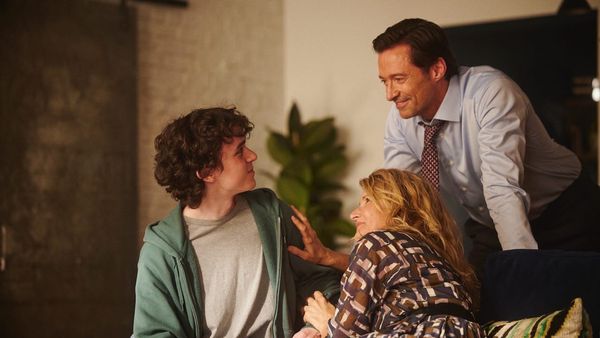Eye For Film >> Movies >> The Son (2022) Film Review
The Son
Reviewed by: Anne-Katrin Titze

Florian Zeller’s The Son, adapted from his play Le Fils by Christopher Hampton (their collaboration on The Father won them the 2020 Best Adapted Screenplay Oscar and BAFTA), stars Hugh Jackman, Vanessa Kirby, Laura Dern, Zen McGrath, and Anthony Hopkins (Oscar and BAFTA wins for The Father; soon to play Sigmund Freud in Matt Brown’s Freud's Last Session with Matthew Goode as C.S. Lewis). The centre of this intergenerational drama is occupied by a cypher. Nicholas (McGrath) is 17 and lives with his mother Kate (Dern, terrifically flustered and well-meaning) in Brooklyn.
Nicholas is in pain, constant unbearable pain, he says. When his mother finds out that he had stopped attending school, a fact he cleverly managed to hide from her, she shows up at her ex-husband’s doorstep to discuss the situation. Peter (Jackman, giving this role his all) and his second wife Beth (Kirby) just had a baby boy, and when Nicholas asks his father to move in with them in Manhattan, things become even more complicated.

Peter, a successful lawyer, is at the brink of being offered a dream job to work on a senator’s campaign in Washington, but for him family comes first. He recognizes that his older son needs him and takes control in the way he knows how. At one point he buys Nicholas a velvet jacket in SoHo that he saw a French intern in his firm wearing. It is a small bonding moment between father and son, but not because of the jacket, which couldn’t be of lesser interest to the son.
A sense of claustrophobia fills the rooms as Nicholas’s mental health issues show their various facets. Flashbacks to a vacation to Corsica from a bit over a decade ago - when little Nicholas learned to sink or swim in the sea from his father - illuminate a memory that all three members of that family unit, Peter, Kate and Nicholas, seem to flee to when things get too tough in the present. When at one point Beth’s earrings go missing, we cannot be sure if gaslighting is going on. Why is there a kitchen knife under Nicholas’s pillow in his new room with the brick wall outside the window? This is a film of boundaries and barriers and attempts to overcome them.
Early on when Kate arrives at Peter’s apartment door, he doesn’t invite her in. In ancient traditional narratives the devil cannot enter a home unless he is invited to. Laura Dern starred in Joyce Chopra’s 1985 film Smooth Talk (adapted by Tom Cole from Where Are You Going, Where Have You Been, a short story by Joyce Carol Oates) as a teenager who does confront the devil at the doorstep. Not that the mother is more devilish than anybody else in The Son - Zeller does not play the blame game and shows instead how the guilt the characters feel is already mounting up to a degree that doesn’t allow any real understanding of the other.
During a pivotal scene we get a better understanding of Peter’s own role as son, when he pays a visit to his father Anthony, played by the ever greater and greater Anthony Hopkins. It is a total turnaround from the dementia-plagued father he was in Zeller’s The Father. Here Hopkins portrays a monstrously cold man of politics who couldn’t care less what teenaged Peter had to go through. As the trauma of generations unfolds with shivering precision you may think of Ibsen’s Wild Duck, not only because Maria, Anthony’s housekeeper, prepared a little lunch of duck, but also for a shotgun and the space that holds it.
A shot in the elevator (cinematography by Ben Smithard) gives the illusion of two doors closing on Peter at once. It takes an instant to realize that what we see is a mirror. The disconnect between parent and child, generational rifts in the understanding of self, what to do with acute depression - never has it been more urgent to begin an honest discussion that doesn’t simply pretend to be one. “It’s not unusual to be loved by anyone,” croons Tom Jones during an exuberant dance number that adds a touch of lightheartedness. Father and son can share a moment of cartoon-watching and cereal-throwing, but ultimately, the film states, sometimes love is not enough.
Reviewed on: 17 Jan 2023















